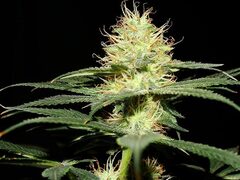Endocannabinoids
(Marijuana-like Substances) Produced from Fatty Foods

A recent article in the UC Irvine Today mentioned that recent
studies at UC Irvine have revealed fatty foods such as potato chips and french fries
produce endocannabinoids which are marijuana like substances that attach to
cannabinoid receptors in the endocannabinoid system.
UC Irvine researchers Daniele
Piomelli, Nicholas DiPatrizio and colleagues found that fats in these foods
make them nearly irresistible and trigger a surprising biological mechanism
that likely drives our gluttonous behavior. The apparent culprit? Natural
marijuana-like chemicals in the body called endocannabinoids.
In their study, the Piomelli team
discovered that when rats tasted something fatty, cells in their upper gut
started producing endocannabinoids. Sugars and proteins, the researchers noted,
did not have this effect.
The process starts on the tongue,
where fats in food generate a signal that travels first to the brain and then
through a nerve bundle called the vagus to the intestines. There, the signal
stimulates the production of endocannabinoids, which initiates a surge in cell
signaling that prompts the wanton intake of fatty foods, Piomelli said,
probably by initiating the release of digestive chemicals linked to hunger and
satiety that compel us to eat more.
“This is the first demonstration
that endocannabinoid signaling in the gut plays an important role in regulating
fat intake,” added the Louise Turner Arnold Chair in the Neurosciences and
professor of pharmacology.
Study results appear this week in
the online edition of Proceedings
of the National Academy of Sciences.
Piomelli said that from an
evolutionary standpoint, there’s a compelling need for animals to consume fats,
which are scarce in nature but crucial for proper cell functioning. In
contemporary human society, however, fats are readily available, and the innate
drive to eat fatty foods leads to obesity, diabetes and cancer.
The findings suggest it might be
possible to curb this tendency by obstructing endocannabinoid activity – for
example, by using drugs that “clog” cannabinoid receptors. Since these drugs
wouldn’t need to enter the brain, they shouldn’t cause the central side effects
— anxiety and depression — seen when endocannabinoid signaling is blocked in
the brain, Piomelli noted.
The extent to which the endocannabinoid
system appears to play in our health it seems it would be unwise to block or clog
the receptors. We'll have to wait and
see what develops from this study.
Director of the UCI School of
Medicine’s Center for Drug Discovery & Development, Piomelli is one of the
world’s leading researchers on endocannabinoids. His groundbreaking work is
showing that this system can be targeted by new treatments for anxiety,
depression and obesity.
Giuseppe Astarita of UCI and Gary
Schwartz and Xiaosong Li of New York’s Yeshiva University contributed to the
study, which received support from the National Institute of Diabetes &
Digestive & Kidney Diseases and the National Institute on Drug Abuse.




 In California, the state where many television shows, documentaries, interviews, and stories have been told about the number one cash CROP being marijuana, a California Judge however seems to disagree. Read more about the California Judge ruling
In California, the state where many television shows, documentaries, interviews, and stories have been told about the number one cash CROP being marijuana, a California Judge however seems to disagree. Read more about the California Judge ruling 



